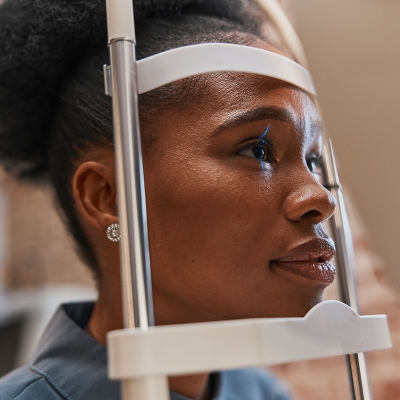A guide to understanding vision benefits renewal
Still need to get a new pair of glasses or supply of contact lenses? Here’s what people need to know before renewing their plan.

A person’s eye health is an important part of their overall well-being. Getting regular eye exams and staying up to date on glasses and/or contact lens prescriptions is equally important. A great place to start when it comes to all these needs is vision insurance.
People can get vision insurance benefits in several ways. Some of the most common include through their employer, a private insurance company, the federal Health Insurance Marketplace, Medicare Advantage plans or Medicaid. Each plan can offer different levels of coverage and may offer varying allowances for glasses and/or contact lenses.
To keep things simple, in this article we’ll be focusing on UnitedHealthcare Vision plans.
Most people get a set of yearly benefits, often including an annual comprehensive eye exam.
To use benefits again the following year, members must renew their plan. Here's a quick overview of what to know about vision benefits and how to make the most of them.
Still need to tap your UnitedHealthcare Vision allowance for contacts and/or glasses? Consider ordering them from the same convenient online location. Shop now.
What a person needs to know about their current vision insurance plan
So, let’s say a person has a UnitedHealthcare Vision plan. Vision insurance is what’s known as supplemental insurance. This means that you pay an additional amount to have vision insurance in addition to a regular health insurance plan.
Vision insurance plans offer coverage for a person’s eye care that’s often not covered by their traditional health insurance. A person will pay a monthly bill (premium) to receive their coverage.
The exception would be if a person needs an eye care provider to keep an eye on a long-term vision condition, like diabetic retinopathy. That’s typically covered by their traditional health insurance plan.
Vision plans can cost anywhere from $5 to $20 per month.1 A person can often find savings when they bundle vision insurance with other types of supplemental plans, like dental insurance.
A vision insurance plan usually includes:
- Routine eye exams
- Prescription eyeglasses, whether covered in full or by allowance
- Contact lenses, often in lieu of prescription eyeglasses
- Lens enhancements, whether covered in full or price protected
- Additional discounts on a range of services and products
When a person chooses an eye care provider in the UnitedHealthcare Vision Network, that helps lower their out-of-pocket costs. (An in-network provider or clinic is one that has contracted with the insurance company to offer services at preset rates.)
Vision insurance has no age limit. Since traditional (or original) Medicare often doesn’t cover routine vision care, many people choose to add a stand-alone vision plan to meet their needs.
Additionally, vision insurance usually doesn’t cover elective surgeries like LASIK, since LASIK isn’t considered medically necessary. (LASIK can also be called laser vision correction.)
However, UnitedHealthcare Vision members can still save up to 35% on laser vision correction.
When can a person renew their vision insurance benefits?
When a person can renew their vision insurance benefits depends on factors like their plan and where they get their insurance. If a person gets their UnitedHealthcare Vision benefits through their employer, they may have a yearly enrollment period.
They’ll want to talk to their human resources (HR) representative (or the equivalent). They’ll know the exact dates of that enrollment period. Those dates may vary from company to company.
That annual enrollment period typically begins near the end of the year. That’s when a person can either re-enroll, change their coverage or add additional coverage. A person’s vision benefits typically kick in at the start of a calendar year — so January 1. But that date can differ depending on when a person enrolls in their plan, if their benefits are set up based on their last date of service or where they get their insurance.
There are some exceptions to that rule. If a person starts a new job in the middle of the year, they’ll get a special window during which they can sign up for their vision benefits.
Before a person renews their vision benefits, they’ll want to ask themselves some questions like:
- Is their coverage level sufficient for their needs?
- Do they have enough budgeted to pay for deductibles (how much a person pays for covered services before their insurance company pays the rest) and copayments (a fixed amount a person pays for covered benefits)?
- What, if any, changes have been made to the plan?
- Have they used all their benefits from the previous year?
If a person hasn’t used all their benefits before the end of the year, they still have some options. Read on to learn more about them.
How can a person make the most of their vision exam benefits before they renew their plan?
What benefits a person uses during their plan year is up to them. Let’s say it’s the summertime, and a person hasn’t had their annual eye exam yet. They’ll have several months to schedule it before the plan year is over.
If a person has UnitedHealthcare Vision benefits, they can schedule an annual exam by doing the following:
- Visit the UnitedHealthcare Vision website
- Search for a nearby eye care provider (enter ZIP code or address)
- Browse the available eye care providers and choose one
- Call the eye care provider and schedule an appointment
Comprehensive eye exams are typically fully covered by a person’s vision insurance plan. That means they’ll come at no cost to them. But it’s important to check with a person’s HR rep or insurance company to be sure.
How can a person make the most of their glasses or contact lens benefits before they renew their vision plan?
Typically, a person can get their glasses and/or contact lens prescription renewed during this annual comprehensive eye exam. They can then take their glasses and/or contact lens prescription and use it to buy a new pair of glasses or supply of contact lenses. UnitedHealthcare Vision members can save by ordering new glasses and/or contact lenses on uhcglasses.com (see below).
If a person hasn’t yet used their glasses and/or contact lens allowance, they’ll typically have access to it until the end of their plan year.
It’s important to note that people who wear both glasses and contact lenses may only receive an allowance for one or the other. That means they could use the allowance to buy new glasses frames. But they’ll then have to pay out of pocket for a full year’s worth of contact lenses (or vice versa).
Regardless, UnitedHealthcare Vision members get discounts for ordering their glasses and/or contact lenses online. Here are a few of the perks:
- Save 10% by ordering contact lenses online (and get free shipping on orders over $99)
- Save up to 50% off by ordering glasses frames online
- Save $25 on blue-light glasses and readers by entering the code UHCM25 at checkout
For people who wear contact lenses, they’ll need a separate prescription to order their next supply. That’s because contact lenses are considered medical devices and sit directly on the eye.2
If a person is new to contact lenses, they may need to book a follow-up visit or visits with their eye care provider. That can be to make sure that the contacts fit well and that the person knows how to wear them correctly and safely.
Families with children who have myopia (nearsightedness) may also use their vision benefits toward certain lenses designed to help manage how the condition progresses. One example is Essilor Stellest lenses — an option that UnitedHealthcare Vision was first-to-market. These lenses look like regular glasses but use a special pattern of tiny lenslets, which help guide light and support more comfortable vision as a child’s eyes grow.3 An eye care provider can help decide if Stellest lenses or another option fits a child’s needs.
What else can a person use their vision insurance benefits for?
If a person has UnitedHealthcare Vision benefits, they don’t have to use their glasses and/or contact lens allowance for just those 2 things. They can also use it towards:
- Lens options and enhancements
- Prescription and/or non-prescription sunglasses
Remember: If a person doesn’t use all their benefits during a plan year, they don’t carry over to the next year. But once a person renews their UnitedHealthcare Vision insurance plan, they’ll have access to a new year’s worth of benefits.
Still have leftover vision benefits to use? UnitedHealthcare Vision has a huge selection of designer sunglasses available online. Order a pair today.
Sources:
- What does vision insurance cover? Healthinsurance.org.
- Healthy vision and contact lenses American Optometric Association.
- FDA Authorizes Marketing of First Eyeglass Lenses to Slow Progression of Pediatric Myopia. U.S. Food & Drug Administration, September 25, 2025


